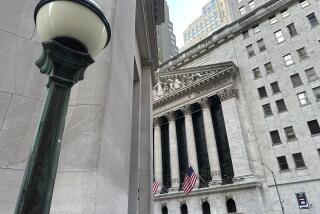Bond Yield Jump May Signal Test for Stocks
- Share via
The yield on the 10-year Treasury note closed Thursday above 5% for the first time since June 2002, signaling higher interest rates on mortgages, corporate bonds and other forms of debt -- and potential trouble for the stock market.
Bond yields have risen steeply in recent weeks as higher oil prices and solid economic growth have ratcheted up inflation fears and increased the chances of further rate hikes by the Federal Reserve.
But Thursday’s move on the eve of the three-day Easter weekend -- U.S. financial markets are closed today for Good Friday -- may prove particularly significant.
“The 5% level is a psychological barrier that a lot of people don’t like to see,” said Matthew J. Smith, portfolio manager at Smith Affiliated Capital. “It could weigh heavily on the stock market.”
Despite that omen, and a jump in oil futures to a fresh post-Hurricane Katrina high, stocks managed to eke out gains Thursday, buoyed by a modest advance in tech shares. Bullish analysts say stock investors have been able to shrug off rising rates and focus on the expanding global economy and the prospect of continued corporate earnings growth.
The 10-year T-note yield closed at 5.05%, up from Wednesday’s close of 4.98%, while the benchmark 30-year fixed mortgage rate ended the trading week at 6.49%, its highest level since July 2002, according to mortgage company Freddie Mac.
That doesn’t bode well for an already wobbly housing market, Smith said, noting that recent data have shown declines in mortgage applications, refinancings and new construction.
Sales of existing homes are expected to drop 6% this year, while new-home sales are projected to fall 10.9%, according to the National Assn. of Realtors.
Some analysts expect mortgage rates to hit 7% by year-end.
Although U.S. economic data have remained robust -- retail sales rose a better-than-expected 0.6% in March, the Commerce Department reported -- strategists said higher interest rates were sure to eventually take a toll on consumers.
“The softening in the housing market is probably the leading indicator as to where our economy is headed,” said Stephen Kane, co-manager of the Metropolitan West Total Return Bond fund in Los Angeles. “Yields at these levels will no doubt affect consumer spending.”
Kane said that although the Fed is almost certain to raise short-term interest rates one more time at its next meeting May 10, it may then pause from its nearly 2-year-old credit-tightening campaign to gauge the broad effect of a weakening housing market.
With long-term bond yields climbing more than short-term yields recently, the effect of the Fed’s 15 straight quarter-point rate hikes is being widely felt.
The steeper yield curve may help keep inflation in check, lessening the need for future rate hikes, Kane said.
Fed governors sent mixed signals in separate speeches.
Susan Bies said after a speech in Los Angeles, according to Bloomberg News, that the central bankers were “getting closer to the stopping point.”
But fellow Fed Gov. Donald Kohn had sounded more open-minded earlier in the day, when he said he didn’t know “how much policy firming will be needed” to keep the economy at a pace of growth that is “sustainable” without being overheated.
In addition to inflation worries and uncertainty about the Fed, the prospect of higher returns abroad appears to be luring foreign investors away from U.S. Treasury securities, steepening the climb in yields.
Japan’s resurgent stock market, up 6.8% year-to-date, has drawn interest, strategists said, and higher foreign bond yields also are providing competition to domestic bonds.
On Wall Street, the Dow Jones industrial average Thursday climbed 7.68 points, or 0.1%, to 11,137.65. The broader Standard & Poor’s 500 index gained 1 point, or 0.1%, to 1,289.12. The technology-heavy Nasdaq composite index gained 11.43 points, or 0.5%, to 2,326.11.
Losers beat winners on the New York Stock Exchange by 6 to 5, but gainers topped losers by 3 to 2 on Nasdaq.
For the shortened week, the Dow rose 0.2%, but the S&P; 500 fell 0.5% and Nasdaq lost 0.6%.
In New York commodity trading, fears of supply disruptions over the weekend sent crude up 70 cents to $69.32 a barrel, nearing the Aug. 30 record of $69.81.
Among the equity highlights:
* An index of home builder stocks fell for a sixth straight day. Pulte Homes lost 19 cents to $39.50 and Toll Bros. dipped 40 cents to $32.74.
* In the tech sector, IBM gained $1.23 to $81.98 as Lehman Bros. boosted its first-quarter earnings target on Big Blue, which reports next week. Elsewhere, Applied Materials climbed 69 cents to $18.11 and Intel added 33 cents to $19.45. But chip maker Advanced Micro Devices slumped $3.62 to $31.80 after guiding down sales targets for the current quarter.
* General Electric slid 57 cents to $33.89 after meeting quarterly earnings estimates but slightly tempering expectations for this year.
* McDonald’s slipped 34 cents to $34.85 after affirming analysts’ earnings expectations for the latest quarter.
More to Read
Inside the business of entertainment
The Wide Shot brings you news, analysis and insights on everything from streaming wars to production — and what it all means for the future.
You may occasionally receive promotional content from the Los Angeles Times.










